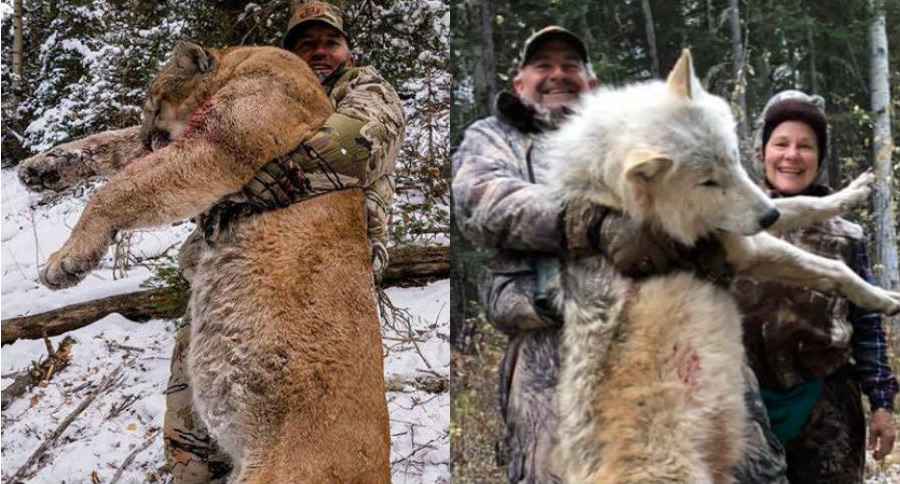You'd think that anti-hunters and animal rights would tire of saying ridiculous things. Here are a few more of the stupidest.
As we mentioned in Part I of this two-part series, I shared a photograph on my Stumpjack Outdoors page of a hunter holding a very large wolf. The photo generated over 10,000 reactions and comments, and it's still going. At least part of the reaction we got from people was due to the accompanying text I included with the image.
We made a stand that we weren't going to be bullied by anti-hunters or animal rights zealots, and we weren't going to give them a platform from which to air their vulgar and ignorant opinions.
Here's what I wrote with the photograph:
Let us be very clear here. We will not tolerate hateful, rude or stupid comments on this page. We support hunting and sound wildlife management practices. That includes hunting and managing all species, including large predators. If you try to make any ridiculous and hateful comments your comment will be deleted and you will be blocked/banned from the page. Simple as that.
There are many reasons to harvest predators, including meat acquisition, population control, wildlife management goals for both predator and prey species, fur, adventure, problem or nuisance animals, domestic livestock depredation, and environmental balance. There is nothing wrong with killing large predators if done with these precepts in mind.
Emotional responses that ignore biology and science are not valid reasons either for or against hunting.
We're posting this picture because we received some hateful comments on our last mountain lion photo. We won't be dissuaded or bullied by social media bullies and ignorant animal rights people. If you don't like these kinds of photos then simply keep scrolling or don't visit the page anymore. Try to be a mature adult. Your negative opinions won't sway anyone and aren't nearly as important as you think they are.
Source: Byron Wolf
@Wolf Huntin Adventures
Most of the comments we received were positive and supportive. But we also got hundreds from the anti-hunting/animal rights crowd that were rude, vulgar, ignorant, and just plain stupid. Pretty predictable. We deleted those ugly comments and banned the people who made them.
I've seen enough anti-hunters run roughshod over hunting pages and photographs, and we decided that their ill-informed opinions would find no platform on our outdoors page.
We did try to address legitimate questions and comments that were sincere and polite. But many of the anti-hunting/animal rights arguments repeated themselves over and over again. These arguments have become scripted responses from the anti-hunting crowd. This in spite of the fact that their emotional contentions have long been debunked or countered with sensible, reasoned arguments.
That is how the anti-hunting versus pro-hunting debate goes. It is emotion versus logic, and unfortunately logic will never trump emotion when it comes to changing minds or convincing people of the ridiculousness of their opinions.
Here is the second installment of the Stupid Things Anti-Hunters Say, but with the caveat that the last couple aren't so much things that anti-hunters say. Instead, it is actual hunters who make these questionable comments!
"Karma will get you for killing innocent animals."
This is a favorite of the holier than thou crowd. Hunting is a heinous, immoral deed perpetrated by evil people. At some point in the future that evil will justifiably be revisited upon the perpetrator. And of course, only the anti-hunters hold the key to understanding what is moral and what isn't.
It isn't enough to simply disagree with hunting. One must look upon it with disgust at every level, and one must pontificate, from one's lofty moral perch, on the spiritual comeuppance that is undoubtedly in store for the evil hunter. The self-righteous arrogance is enough to make you lose your breakfast.
There's really not much you can respond to this with. I'd say try to look at it with a sense of humor.
Karma is a Hindu and Buddhist concept that adheres to an acceptance of fate or destiny. It's doubtful that any of the people using this phrase even truly understand what karma actually entails.
The latter part of the statement—concerning "innocent animals"—is a little more interesting, philosophically at least. Like murder, guilt or innocence doesn't apply to the animal kingdom. In order for an animal to be innocent, it must also be capable of being guilty of something.
Those determining conditions simply don't apply to animals. Animals behave instinctually, not premeditatively. A mountain lion that kills a deer is not guilty of killing an innocent deer. It's just doing what mountain lions do.
https://www.instagram.com/p/Bp97w7chD9c/
The only possible way to ascribe guilt or innocence to an animal is if you anthropomorphize them. That is, you must imbue them with human qualities. Disney animal characters are anthropomorphized. They are fictional versions, more human than animal, of the real thing.
Bambi is such an example. Unfortunately, Hollywood movies unduly influence a lot of people. So much so that the lines between reality and fantasy become blurred.
There's not much to say to these people. No amount of common sense or reason will make any difference. They see wildlife in cartoon and storybook terms.
"You shouldn't kill any sentient beings."
This sentiment does, in fact, have a moral component. At least it can be argued that there is some level of morality to it.
Sentience, in animal terms, is the ability of an animal to experience pleasure and pain, along with the ability to act in relation to those experiences. It might not be too much to say that animals have "desires" for certain experiences. The desire to avoid pain, for example, or the desire for companionship. Other desires—food, water, mating and the like—are probably more instinctual than discriminately desired.
In any event, the main problem with this sentiment is that it, again, draws a mental and physical equivalence between humans and animals. A deer is the same as a little girl is the same as a hyena is the same as a boy is the same as a wolf and so on. We all know that there are people in this world who value animal life more than human life. We see them commenting on social media every time there's a picture of a hunter with a downed grizzly bear.
Or a movie director with a triceratops! Remember the famous image of Steven Spielberg with a Jurassic Park animatronic dinosaur? It generated hundreds of hateful—and utterly clueless—comments from anti-hunters who actually believed that the seated man was a hunter who had shot and killed the triceratops.
But the view that a human is morally or cognitively the same as an animal is an abnormal opinion. A "boy is a rat" is a view that the overwhelming majority of reasonable people overtly and rightly reject. While there are some biological similarities and some overlap in other areas, animals are not the same as humans. Animals outstrip us in physical senses and physical abilities. We dominate them in every other cognitive way (sentience).
But again, if avoiding killing sentient beings was a sincere concern of animal rights advocates and anti-hunters, where does that leave them? Our very existence is in some way dependent upon the death of other creatures. We live—eat, clothe ourselves, power our homes and automobiles, purchase all of the things that clutter our lives, etc.—because essentially we are willing to kill, either directly or indirectly, other creatures...sentient creatures.
Life inherently demands death. Hunters simply choose to act in that system honestly and directly, with respect for the animals whose lives we take.
But make no mistake, that vegan who types their disdain upon seeing a computer image (a computer whose manufacture is indirectly responsible for countless animal deaths) of a hunter and a dead mountain lion, from the safety of their apartment complex (a dwelling that displaced hundreds of sentient creatures), while eating their vegan sandwich (which killed even more animals in the growth, harvest, and distribution of its ingredients), is responsible for more deaths of sentient creatures than the deer hunter who kills a single buck to feed his or her family.
These people just do it with their wallets. It's hypocrisy and cowardice (lacking the courage of their convictions) at its worst.
The higher up the food chain we go, the more passionate the condemnation against hunting sentient creatures becomes. Killing big predators—charismatic megafauna—earns more outrage than killing a turkey, for example. And it garners many times more outrage than fishing or killing a mouse that gets into the basement. Yet each of these creatures is sentient. This shows, again, that these folks haven't really thought this through and that it's a purely emotional response.
"Trophy hunting is immoral."
Trophy hunting has earned a bad name, from both anti-hunters and, unfortunately, from some hunters as well. The term has now been laden with so much negative baggage that it's difficult to separate it from its erroneous social perception of wanton killing solely for antlers, rugs, or the "thrill."
Trophy hunting nowadays implies thrill killing and nothing more. But thrill killing simply doesn't take place in any credible amount. Trophy hunting, on the other hand, should imply what it essentially is: unusually large or otherwise distinctive specimens that, along with other attributes that include age, disposition, breeding life and environmental conditions, make them uniquely appealing to the individual hunter.
A very large whitetail deer, for example, is a trophy to a hunter who is looking for the maximum amount of meat to take home. A blacktail deer that lives in extremely rough habitat is a trophy for a hunter who values a challenging hunt. A brace of beautiful ruffed grouse is a trophy for a hunter who values tough wingshooting and good eating. An old bull elk, well along in age and with a unique antler configuration, is a trophy for an experienced elk hunter intent on selecting and following a particular animal.
There is nothing immoral about this kind of hunting. One could argue that killing an animal and taking its antlers or horns and nothing else is immoral. On that I think we would all agree. But that doesn't happen, at least not in any substantive numbers or among any serious hunters.
Modern hunting ethics and many game laws demand that the meat from an animal must be taken. Even in Africa, where a hunter cannot bring the meat from an animal back into the United States, that meat is fully utilized by the local population. Nothing goes to waste.
Trophy hunting is actually seen by most credible biologists and game managers as vital to wildlife conservation and sustainable game populations. Sport hunting has been hailed as being largely responsible for the success of conservation programs across the world and for ensuring that wildlife and habitat remain viable.
For instance, in African countries like Namibia, where well managed trophy hunting is an integral part of their game management system, wildlife is booming. In countries where it is discouraged they constantly struggle with dwindling wildlife populations and rampant poaching.
https://www.instagram.com/p/Bria6QGlBif/
Of course there are slobs in the hunting community, just as there are slobs and ne'er-do-wells in every human endeavor. But they are the minority. Most hunters are honorable, ethics-driven people. I submit that trophy hunting—or selective hunting, as Jim Shockey prefers to call it—is the foundation upon which our modern code of hunting ethics is built.
Without the ethics that envelop trophy or selective hunting, the pursuit changes to one of simply hunting for meat. We've seen what happens when people hunt solely to procure meat. Witness the plight of the passenger pigeon and the American bison. But we'll revisit that in a moment.
No, trophy/selective hunting is moral. It is ultimately the source of the fair chase ethic.
"Hunting with dogs is not hunting."
This charge came in tandem with the image of the wolf kill we shared, on the previously mentioned photo of a hunter holding a mountain lion. Interestingly, it also appeared, several times, on the image of the hunter with the wolf. I believe many people just assume that big predators are hunted with the aid of dogs.
What is disturbing about this comment is that it does, in fact, come from non-hunters and some in the hunting community alike. The usual refrain is that hunting with dogs is easy, that the hunter doesn't have to do anything but walk up to the treed or bayed animal and shoot it. That somehow it is dishonorable—like cheating—to hunt predators with dogs.
Nothing could be further from the truth. It is neither easy nor unethical.
Hunting with hounds requires a great deal of training for the dogs, excellent woodsmanship, a keen eye for spotting fresh tracks and sign, the experience and ability to understand what the dogs are communicating through their barking, and a lot of physical stamina to follow and keep up with them. It's physically demanding and challenging, much more than many other types of hunting.
Additionally, hunting with dogs allows the hunter to get close to the animal and thus to more accurately identify its sex (if sex determination is a factor for dispatching it). In that sense, there is no guesswork. You're able to get close for both sex identification purposes as well as for making a clean shot. That's ethical hunting.
Hunting with dogs is also a traditional hunting method that has long roots. Ever since humans have hunted they have employed canine companions to partner with them in their quest. Several Amerindian tribes utilized dogs in hunting, as did virtually every people from practically every place on the planet. With a pedigree and history like that, it seems foolish to say that hunting with dogs is not hunting. Most certainly it is.
And where do these hunters who say such things draw the line? Dogs used in upland bird hunting are okay, according to some, but dogs used to hunt mountain lions are not. Where is the logic in that?
We use dogs to tree squirrels, point out pheasants and quail, retrieve ducks, hunt raccoons, chase rabbits, bay wild hogs, even search for downed deer, and somehow running bears or lions is looked down upon? That's just nutty anti-hunting talk that has managed to worm its way into the minds of some unthinking hunters. And unfortunately, that's just what anti-hunters want.
"I'm a meat hunter. Anything else is just trophy hunting, which I'm opposed to."
This one, of course, ties into the "Trophy hunting is immoral" canard above. But this declaration is, believe it or not, uttered by some hunters. Some anti-hunters use it as well, to cloak their anti-hunting sentiment in a veneer of disingenuous acceptance. "You better eat that!" they'll say to a photo of a hunter with a bear, ram or mountain goat, as though they're really concerned with the hunter's dietary habits.
In truth, they oppose hunting, period, and are aghast that such a "majestic creature" would be killed for any reason.
The sad part of this, like the hunting with dogs aversion above, is that some hunters have also adopted this attitude. On the surface it seems like a noble statement: "I only hunt for food!" But it is a myopic viewpoint that ignores the realities of game management and biology, of human cultural and social needs, and of our own history and implementation of the North American Model of Wildlife Conservation.
https://www.instagram.com/p/BrOVhQclnGY/
Hunting for sustenance, for meat, is indeed a noble and highly laudable pursuit. It is at the core of why most of us head into the field or woods in the first place. I too believe that if you're going to kill something, you should eat it if that is at all practical.
But there are more reasons for hunting and killing game than solely for meat. For one, there is the issue of balancing wildlife populations that we talked about in the first installment of these two articles. For example, wolf numbers must be kept in check if we want healthy ungulate populations. There are times when the numbers of some animals simply need to be brought down for the health of the entire ecosystem.
Additionally there is occasionally the issue of problem or nuisance animals. For example, bears that have become dangerous to humans; unchecked beaver growth that damages waterways or areas where people live; exploding raccoon or skunk populations in urban areas, where the spread of rabies and other disease is prevalent; squirrels infesting homes, etc..
Sometimes we do indeed kill for valid reasons other than food procurement. Do you eat every mouse you trap in your basement?
We also harvest some animals for their fur, which is a perfectly legitimate reason. While we can, and some hunters or trappers do eat what they catch, that is not an entirely practical matter with many animals, particularly for large numbers of furbearers. In such cases the carcasses are often processed into fertilizer. Certain other parts—glands, skulls, claws—are harvested and processed for additional monetary income. Nothing is wasted.
We also hunt predators that prey on domestic livestock. Protecting livelihoods and property is a reasonable response to predation. The meat from, say, a mountain lion killed by a rancher protecting his herd of cattle is a bonus, but it's not the primary reason the lion was killed. When you make this argument, however, prepare to hear the "They were here first!" objection. We dealt with that in Part I of this series.
So you see, there are other reasons besides meat to hunt and kill animals,by private citizens and by the federal government, that most people (including hunters who might initially raise this objection) would find reasonable if they thought about it.
While I fully endorse eating anything you kill, I also realize that that is not always practical or applicable. I'm not going to eat the mouse that might invade my basement, and I'm not going to eat the invasive carp that befouls and threatens my favorite lake.
Declaring that you only kill what you're going to eat is a bit of unrealistic self-righteousness. Hunters should not be doing the anti-hunting crowd any favors by declaring such things.
Eat what you can, absolutely, but don't declare that those who don't follow your unrealistic ethos are somehow unethical or beneath contempt.
Every living thing deserves respect. We should never take a life wantonly or casually, be it a wolf or a mouse. But consuming every animal is also not the ultimate show of reverence, nor is it practical in every situation.
Conclusion
To get the full picture, make sure you click here for Part I of this series. We are forced to contend with the uninformed, ignorant, emotional, and hateful anti-hunters of the world. Occasionally we also have to educate our fellow hunters who have fallen victim to anti-hunting propaganda.
But go easy on our fellow hunting brothers and sisters. We can be tricked into buying into some of the pervasive anti-hunting rhetoric, particularly when those emotional arguments are cloaked in a veil of hunter ethics.
I think the best response to anti-hunters and animal rights zealots in most cases is to simply ignore them, especially when their comments are particularly vitriolic and ugly. If, on the other hand, they seem genuinely confused or just misinformed, you might try educating them.
You never know, you might just change someone's mind if you're courteous and persuasive.
Like what you see here? Experience more articles and photographs about the great outdoors at the Facebook page, Stumpjack Outdoors.
NEXT: CAN-AM'S 2020 DEFENDER LINEUP CHANGES THE LANDSCAPE FOR HUNTERS, RANCHERS
WATCH




